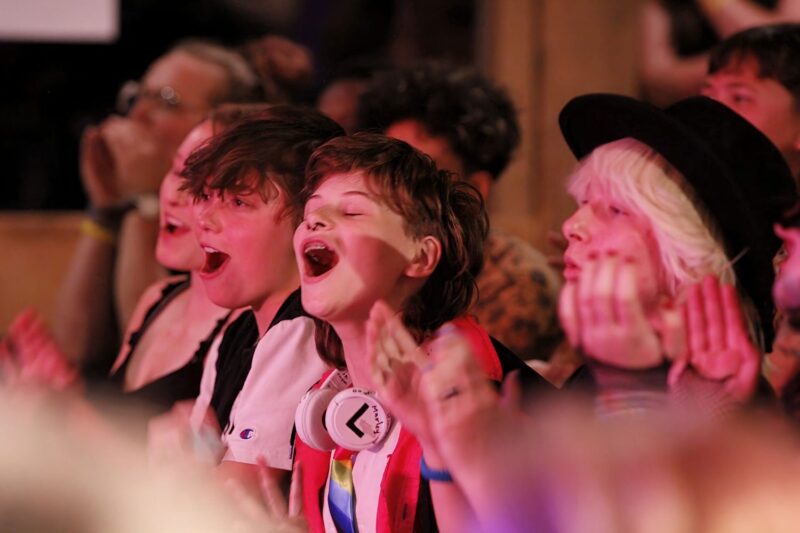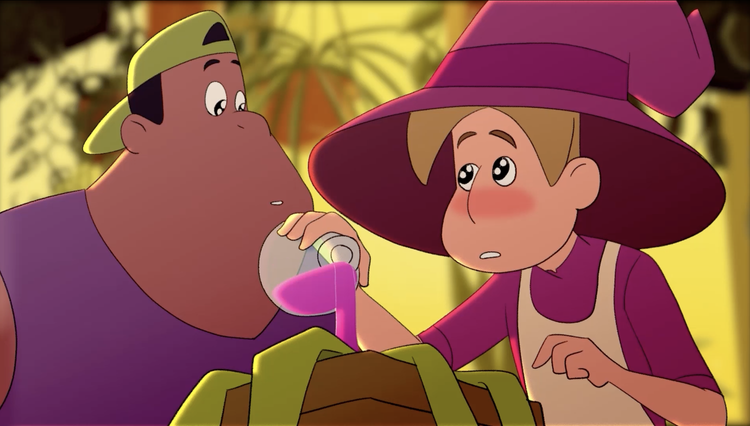Stories of Queer Joy: Past, Present, and Future
Review of Seattle Queer Film Festival at Three Dollar Bill Cinema
Written by TeenTix Newsroom Writer Abby Bernstein and edited by Teen Editorial Staff Member Aamina Mughal

Content Warning: Mentions of homophobia, self-harm, and bullying
“There are gaps in Queer history because we haven’t focused so much on telling our own stories, and we’ve lost a lot of history that way. I think [storytelling] is a way to leave a record of who we are,” says Jen Markowitz, the director of Summer Qamp. At the Seattle Queer Film Festival, hundreds of filmmakers worked to fill these gaps, making visible the stories of the Queer community. The Seattle Queer Arts Film Festival took place October 12 to 22, showcasing Queer films from around the world. The festival's focus this year was Queer Joy and its significance to the Queer experience. It explored this theme through a range of perspectives and styles, moving from comedy to drama and national issues to small, mundane moments in a person's life. Through their portrayals of diverse experiences, the films managed to build bridges across the past, present, and future of the Queer community to tell the timeless stories of Queer pain, perseverance, and, most profoundly, personal and communal joy.
From the hundreds of selections the festival offered, I was able to watch Summer Qamp, directed by Jen Markowitz, and LGBTQ: From Gen A(lpha) to Z, a series of short films including The Last Gay in Indiana (Olivia Fouser), Piece by Piece (Reza Rasouli), My Life at the Beginning (Ana Puentes Margarito), Tater Tots (Julia Berkey), Bruno (Michael Dean Wilkins), Zeke’s Magic Plant Shop (Lucas Marchu and Keaton Hanna), To All That We Are (Kristian Cahatol), and Carly Dolls (Maudie Schmid and Jaxson Power).
Summer Qamp documents a group of young people’s time at Camp fYrefly, a summer camp offering a safe and supportive space for queer, non-binary, and trans youth in rural Alberta, Canada. The documentary follows the teens as they unpack past traumas, grapple with identity and expression, and ultimately find joy in an uplifting and understanding community. The film consisted of both scenes of camp life and individual interviews that helped develop a broader understanding of each character and how they experienced Camp fYerfly. The film used bright colors and uplifting music to further capture the story’s hopeful tone, but likewise respected sentiments of struggle with more subtle musical features as to never feel inappropriately cheerful. Overall, I felt that Summer Qamp came as close to portraying the complex and nuanced manifestation of Queer Joy in teens as any one-hour and twenty-minute feature could.
In LGBTQ: From Gen A(lpha) to Z, the short films take audiences on a wild journey, from a mystical animated world in which a wizardly plant shop owner and customer fall in love (Zeke’s Magic Plant Shop), to a grimly imagined future in which one teen desperately resists the conversion efforts that have suppressed the rest of America (The Last Gay in Indiana). In many ways, these short films could not be more different, being created in different countries, languages, and formats. Some presented a more polished product, completed with smooth, professional-level soundtracks and videography. Others provided a more intimate and handmade feel to viewers, pulling them in through the plot and writing if not flawless cinematography. They even ranged in color palettes, levels of characterization, and acting technique (with an especially stunning performance by Cossette Silguero in My Life at the Beginning). Despite these differences, the films find common ground, such as the value of community and tones of hopefulness and resilience. While disparate in themes and style, taken together the films provide viewers with insight and understanding of the rich diversity of Queer experiences through individual points of view. In the stories these films share, Queer people can learn more about where we have come from and where we might choose to go as individuals and as a community.

Summer Qamp, while focused on contemporary teen lives, also emphasizes the value of learning from our past, especially when it comes to the Queer community and its often-untold history. At one point during the week of camp, a group of Queer elders come to Camp fYrefly to talk to the teens. They share stories of their lives, whether it be their experiences as closeted teens or their works as activists and changemakers. It is a touching moment for the campers who get to see their own journeys of self-discovery and purpose reflected in an older generation. During my interview with Jen Markowitz, director of the film, they spoke of the importance of these intergenerational bonds within the Queer community. They said that “when young Queer people meet elders, they find out where they come from. When elders meet young people, they find out where we are going. It’s the connective tissue in our broader knowledge of Queer history.” For Markowitz and many others, this knowledge was not available to them growing up. This history is crucial though, as it can show us how to fight for our rights and our joy. The value of having these lessons documented as they are in Summer Qamp cannot be overstated, and, as Markowitz said, it is just as vital to tell the stories of today's battles and triumphs as we imagine and work toward a better future.
Among these diverse and wildly unique films lies a common thread: Queer Joy cannot be separated from the hardships of the Queer community. Many of the films included stories of trauma and discrimination, but from these battles, the characters in the film were able to achieve joy and fulfillment as they rose above. It appeared in Piece by Piece as two friends opened up to one another about how they approach self-expression. Here joy was present in the form of the small victories inherent in expressing who you are. For both characters, each step they took brought immense joy, as it represented one challenge and leap of faith they had overcome. In To All That We Are, it was reflected in the euphoria the character felt in finally finding a community that supported them.
In Summer Qamp, viewers see this theme most clearly in the stories of Manessa and Spider. While the campers all clearly find safety, relief, and community at camp, that experience does not erase other struggles. Manessa's relationship with identity and intersectionality is not an easy one. They talk of their struggle to find a community that represents all their identities and their difficulties in finding labels that they feel fit them. Simply belonging to the queer community does not eliminate their need to find other points of connection. When they finally meet a counselor who, like Manessa, is also Queer, Haitian, and adopted, it is a moment of true elation for Manessa in which they feel fully seen. At another point, Spider opens up about his experiences with bullying, isolation, and self-harm. One of the most poignant lines of the film is when Spider says "I don't hate my scars and I don't dislike them. I love my scars because when I look at them, I see that they're healed, and they're done. I look at them and remember I don't need to do that anymore.” We see in all these character’s various stories that Queer Joy is not the mere absence of suffering, but rather the triumph over it. For Queer people, suffering and joy are not binary emotions or experiences. The two must often work together to help us achieve a sense of fulfillment, identity, and victory. Struggle empowers us to be truer to ourselves, and challenges others to do the same. As Markowitz put it in their interview, “Queer Joy is who we are, and we have managed to remain abundantly joyful, no matter what the world throws at us…That doesn’t mean that we also can’t experience pain together - we sure can - but we will always have joy.” It is in this sense that resistance is Queer Joy, and Queer Joy is resistance.
In a world that still does not always accept our differences, Queer people all too often must overcome discrimination and suffering amidst the journey of embracing our unique identities. The films of the Seattle Queer Film Festival show us that, by telling the stories of our individual struggles, pain, identities, and loves, we can bring our true selves to the building of a joyful Queer community. While at first, the films may not seem “joyous” enough to earn this year’s theme of Queer Joy, audiences are forced to understand that Queer Joy cannot be kept separate from the Queer communities' struggles. By persevering through these struggles, we can foster joy and light in our lives that can, in turn, make space for others to discover their own selves. Some films, such as Summer Qamp, more accurately portrayed the experiences of Queer teens than perhaps others did. Some films were more polished, some were more engaging, and others were more emotionally impactful. I can not say that I loved each film equally, but in the end, I found that the professional quality of each film was not the point. Together these films told a collective narrative of joy, hope, love, and resistance that transcended individual cinematography, acting, or writing. If the films in this year’s festival communicated any message to audiences, it is that the Queer people of our past and present have relied on community to rise above pain. It is now up to us to create safer spaces that encourage and sustain growth. In the face of difficulties and rising oppression, we must be there as friends, advocates, and allies, just as the characters in these films are. Above all, we must be joyful.
Lead Photo Credit: Summer Qamp Directed by Jennifer Markowitz (2023)
The TeenTix Newsroom is a group of teen writers led by the Teen Editorial Staff. For each review, Newsroom writers work individually with a teen editor to polish their writing for publication. The Teen Editorial Staff is made up of 5 teens who curate the review portion of the TeenTix blog. More information about the Teen Editorial Staff can be found HERE.
The TeenTix Press Corps promotes critical thinking, communication, and information literacy through criticism and journalism practice for teens. For more information about the Press Corps program see HERE.


